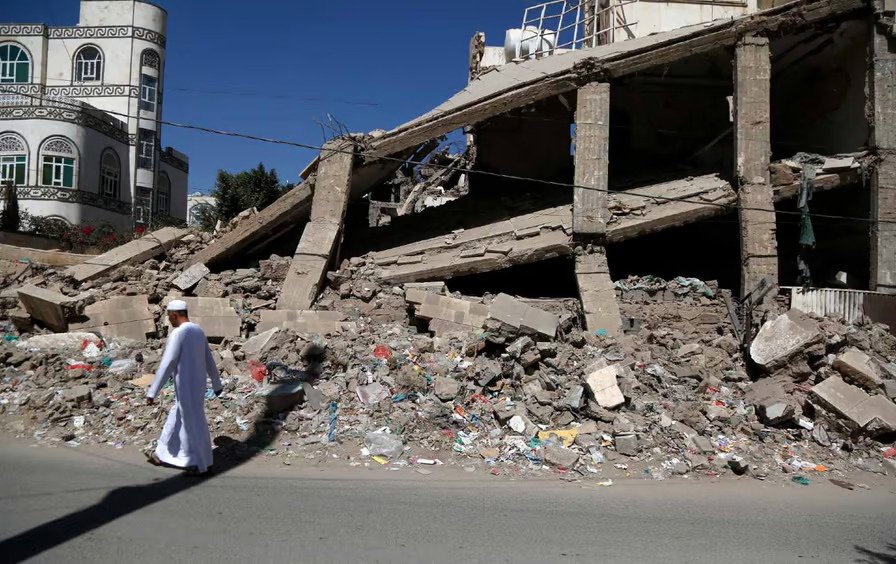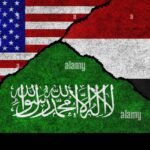
Many international players are acting out their agendas in the current conflict in Yemen, the major ones being the US and its western allies including Canada and Europeans like UK, France, Germany, (the usual culprits) etc.
USA
One of the major International players in Yemen conflict, if not the major player is without doubt the US.
The US involvement in Yemen started in the 2000s, chasing after Al Queda and allied groups, which intensified after the formation of AQAP. They were able to contain the threat of AQAP with a strong partnership with the long-term President of Yemen, Ali Abdullah Saleh and his successor Abdrabbuh Mansur Hadi. It is estimated that, since 2002, the US has carried out over 400 military strikes in Yemen.
When the Houthis seized control of Sana’a in 2014-15, Saudi Arabia launched aerial strikes, strongly supported by the US. In 2023, the Houthis started Red Sea blockade and allied activities against Israel, which gave the US more reasons to continue raging against much of Yemen, not just the Houthis. It could be argued that the US role is limited to supporting its regional allies – but it can also be argued that they may be setting Yemen up for Israelis, thereby boxing in the biggest oil producer of the region, Saudi Arabia. Because their attacks on Yemen continue even while their allies like UAE has withdrawn and Saudi Arabia has scaled down. Al Queda may very well have been a ruse to enter Yemen. Speculating here, of course.
The more obvious reason for US involvement is to control the trade routes. The US, like Britain historically had interest in Yemen due to its location straddling the Red Sea, the Arabian Sea and the Indian Ocean. The US interest in much of the world is to control trade routes and Yemen happens to have influence over Bab el-Mandeb strait. With the Houthis proving that they can cause devastating impact on global trade in the Red Sea, Israel not likely to stop its genocide in Palestine and Houthis therefore expected to continue their anti-Israel campaign, US will pursue their relentless and fruitless war against Yemen, branding Houthis as terrorists.
Whether US and its allies accept it or not, Houthis have become an integral part of Yemen’s politics. Hence to arrive at a peace solution politically through dialogues and negotiations, they have to be made party to the peace process, which cannot happen if they are branded as “terrorists” by US and the rest.
What should be clear is that Yemen never was nor is a threat to US’s national security. This deadly campaign by US and its allies, has left the poorest country in the region bereft of a working government or economy, infrastructure, hospitals, schools, left thousands of people killed, maimed and tortured, millions internally displaced and facing starvation. The only entities gaining from this war are the weapons manufacturers which have their politicians and bureaucrats on board and of course their allies in the region who are heavily dependent on the trading routes.
European countries
Europeans and Canadians joined the US to support the Saudi-led campaign against Yemen right from 2014-15, by way of weapons, campaigns and so forth. Houthis overthrowing the Hadi government was a trigger for the western nations because Houthis were unlikely to be their propped-up ally in a critical region in the Red Sea. Whether they took support from Iran or not, Houthis have a different character all together from their predecessors and the west surely must have felt their clutch slipping.
Then there is the fact that unlike the US and Canada, the Europeans are not self-sufficient in oil and gas and other natural resources. That is why they made up a proxy, a dangerous one, Israel, in the middle east, to ensure that the region remained in turmoil, breaking up weaker oil-rich countries, for their companies to guzzle up, before moving onto the next. In the process, they get to trade their weapons for oil or cheaper deals in oil which make their politicians and proxies richer and get their countries cheaper oil. They could of course get much cheaper deals from Russia, but then how would they support their weapons manufacturers without a manufactured enemy at their borders? So having their local thug in Middle East threatened, would create an existential crisis for them.
They are also interested in pumping up their allies in targeted countries with funding from international agencies like IMF and WB, all based in Europe or US and which employ many of their ex-politicians and bureaucrats. To keep that scam going also, they need someone they can control to be in power. So Europe is committed to go on with this war on Yemen till they see the last of the Houthis.
Countries like the US, Canada, and those in Europe who don’t have any legitimate reason to be involved in Yemen, should have no part to play in the peace talks. What they can and should do is remove the Houthis from the terrorist list and let the regional players and Yemenese arrive at negotiated arrangements and settlements.
The UN
An international entity that is not part of the problem but trying to alleviate some of the misery caused by the conflict and failing miserably as usual is the UN. Even the ceasefires came not by UN intervention but from both sides mutually agreeing for it. Between condemnations and resolutions, their humanitarian aid efforts have been blocked by all sides – Houthis, Saudis, UAE, other allies – preventing Yemenese people from getting essential supplies including food and medicines. Latest estimates of humanitarian needs of Yemen is around USD 2.5 billion for 2025. So even if their pleas for peace have fallen into deaf ears, UN activities ensure that Yemen is not put in the back-burner by the world which is suffering from significant war-fatigue and political shenanigans.
For more on this, please read my article Global conflicts under the radar – Part XXXIV –Yemen – International Players, which is available with half-yearly subscription.

